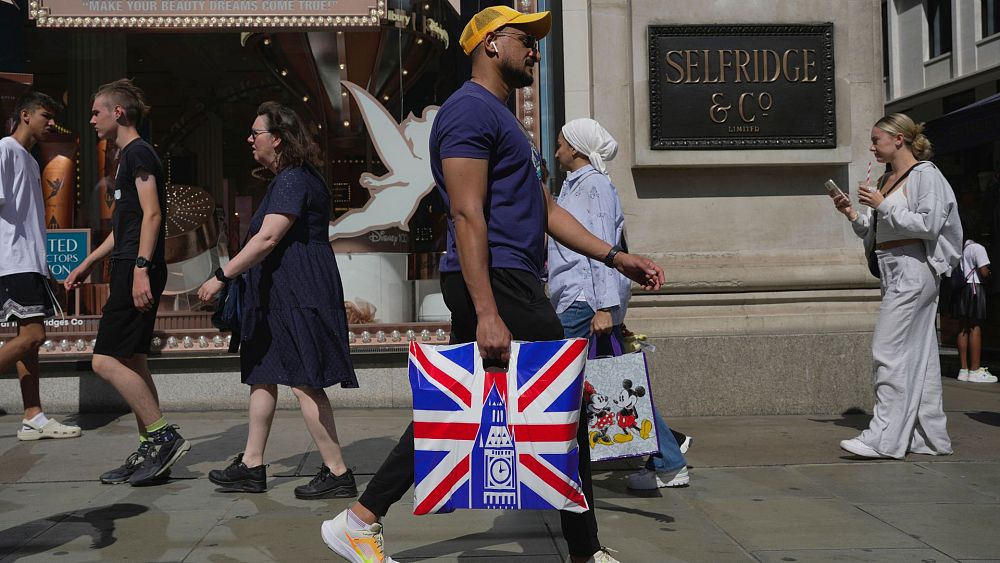### Summary
Average wages in Britain rose at a rate of 7.8% annually between April and June, outpacing inflation of 6.8% in July. However, the long-term picture shows that workers are still no better off than they were four years ago, indicating the need for sustained pay rises to improve living standards.
### Facts
- 💰 Average wages in Britain rose at a rate of 7.8% annually between April and June.
- 📉 Inflation in July was 6.8%, lower than the previous month's figure of 7.9%.
- ⚠️ The long-term data shows that workers are no better off than they were four years ago.
- 🔒 The Bank of England is concerned about wage rises leading to inflation becoming entrenched in the economy.
- 📉 The UK's productivity levels have fallen behind its peers since the financial crisis.
### Additional Information
- The Bank of England and Chancellor discourage asking for higher wages, fearing a wage-price spiral.
- The current UK real average weekly earnings figure is the same as it was in May 2019 and December 2010, and no better than in March 2006.
- Sustained pay rises are needed for workers to improve their living standards.
Vacancies and starting salaries in the UK fell in July for the first time this year, indicating a decrease in inflationary pressure in the labor market.
The week has been driven by macroeconomic data, but the threat of economic contraction is not currently imminent, with the US Ten-Year Note yielding around 4.11% overnight and the US Dollar Index trading around 103.5; the Bureau of Labor Statistics will release its employment-related surveys for August today, with economists expecting non-farm job creation of around 170,000 and wage growth at 4.4% year over year.
Revisions to economic data by the Office for National Statistics (ONS) have revealed that the UK economy was 0.6% larger at the end of 2021 than previously estimated, improving the country's performance relative to its peers in the G7. The revisions also highlight the impact of stockpiling in 2020 and indicate stronger growth in 2021, particularly in sectors such as wholesale trade and health services. However, while the revisions provide a more positive outlook, the UK's economic narrative remains relatively mediocre compared to pre-pandemic levels.
Wage growth in the UK has caught up with rising prices, resulting in real pay no longer falling, according to official figures, although the unemployment rate has risen and job vacancies have fallen. The data will also impact the state pension, which is set to increase by 8.5% next April.
The UK jobless rate rises to 4.3% as unemployment increases, but wage growth surpasses inflation, with total pay rising by 8.5% and regular pay growing by 7.8% in the May-July quarter.
UK gross domestic product (GDP) fell by 0.5% in July, below expectations, with services output being the main drag on the economy, indicating a potential mild recession, and causing investment banks to revise down their growth forecasts; however, some experts still believe that the economy is growing, albeit at a slower pace.
The UK economy contracted by 0.5% in July, worse than expected, due to strikes in hospitals and schools as well as inclement weather, raising concerns of a potential recession.
Goldman Sachs and J.P.Morgan have revised their full-year growth forecast for the UK's GDP due to a sharp contraction in the economy in July, with JPM now expecting 0.4% expansion and Goldman Sachs projecting 0.3% growth. Economists warn of the possibility of a recession as poor economic data continues to emerge, and GDP data indicates a weakening economy.
The Northern Ireland economy is experiencing signs of weakness, with data showing a contraction in the services sector and a slowdown in retail and hospitality due to inflation and consumer spending constraints. The jobs market is also showing negative trends, with a decrease in employee jobs and an increase in unemployment-related benefits. Overall business activity has fallen for the second consecutive month, indicating potential economic challenges ahead.
The UK economy is predicted to continue its stagnant state in 2024, with some economists and business groups even foreseeing a recession, while others, including the Bank of England, the IMF, and the OECD, anticipate modest growth despite high interest rates and a slowing global economic outlook. Different factors, such as labor hoarding and regions bucking the trend, complicate the overall picture, but overall, a stagnant or minimally growing economy seems likely.
Despite ongoing concerns about lackluster growth, revised data shows that the UK's economy has grown faster than originally estimated since the start of the COVID-19 pandemic, outperforming France and Germany.
The United States is expected to add 170,000 jobs in September, which would mark the fourth consecutive month with an increase below 200,000, potentially exacerbating the labor shortage and making it difficult for the Fed to control inflation. The unemployment rate is forecast to fall slightly to 3.7%, while wage growth is expected to rise 0.3%. The impact of labor-union strikes, such as the expanded strike by auto workers, could also affect employment growth.
The ongoing strikes in the U.S., including those in the entertainment industry and by the United Auto Workers, are causing significant economic losses and have raised concerns about a potential recession, with estimates suggesting damages of up to $10 billion and fears of reduced productivity, spending, and hiring.
The UK GDP YoY growth rate is in line with expectations, showing a positive response to July's contraction, while the three-month average also meets forecasts, indicating a choppy economic outlook domestically and internationally as global growth slows down.
